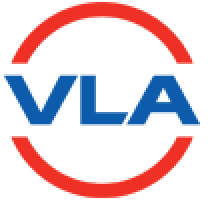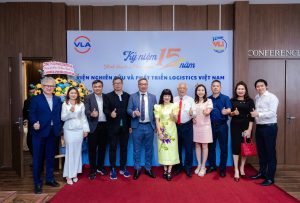VLA/VLI/VALOMA successfully organized the Workshop “Green skills training for human resources in Logistics and SCM industry – linked with ESG” within the framework of VILOG 2024
vlimonamedia
02/08/2024
On August 1, at the Saigon Exhibition & Convention Center (SECC), the workshop “Green skills training for human resources in the Logistics and SCM industry – linked with ESG” within the framework of the Vietnam Logistics Human Resources Training Forum – VLET 2024, the international exhibition VILOG2024 took place with great success, attracting strong attention from experts, researchers, and logistics enthusiasts. This year’s theme, “Green skills training for human resources in the Logistics and SCM industry – linked with ESG”, was exploited in a profound and comprehensive way.
This year’s event exceeded expectations with a rich program, from in-depth discussion sessions to quality speeches from leading speakers. Mr. Truong Vinh Khang, Head of Sustainability Development Department of BSI Vietnam – British Standards Institution BSI, opened with a presentation on “ESG standards and measures to increase ESG ratings for logistics companies”. Mr. Truong Tan Loc, Marketing Director of Tan Cang Saigon Corporation, continued with practical sharing on “Experience in applying ESG at Tan Cang Saigon Corporation”. Finally, Mr. Nguyen Thang Loi, Head of Research and Consulting at the Vietnam Logistics Research and Development Institute, presented the current situation, needs and solutions for green skills training for logistics human resources and supply chain management.
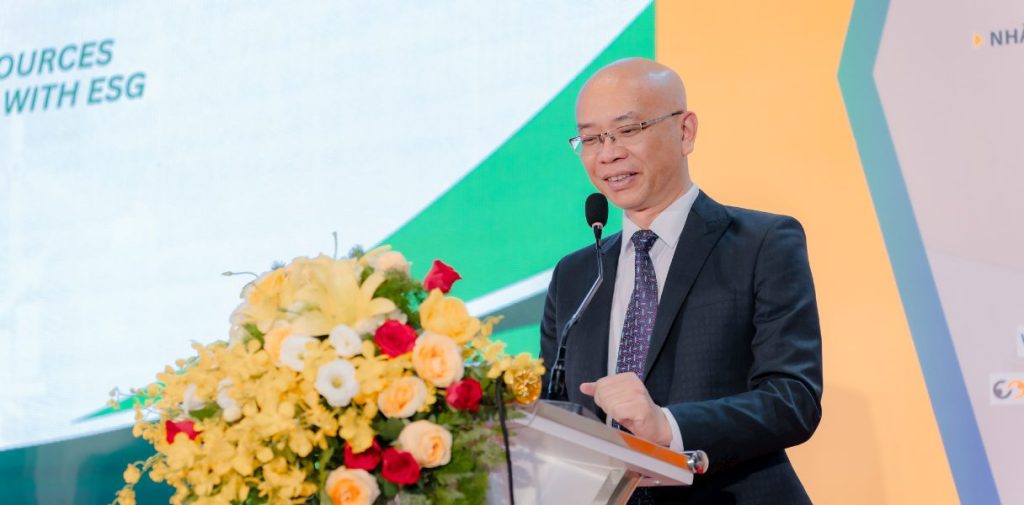
Mr. Hai also emphasized that in the context of the increasing global focus on sustainable development, the logistics industry plays an important role in optimizing the supply chain and minimizing environmental impacts. Therefore, training green skills for logistics human resources is not only a trend but also an essential requirement to meet ESG (Environmental, Social, and Governance) standards. Green skills training helps logistics human resources to be aware of and practice methods to optimize resources, save energy, reduce greenhouse gas emissions, and use resources efficiently. This not only helps businesses comply with environmental regulations but also improves operational efficiency and reduces costs.
To raise awareness among businesses and training institutions about the importance of developing a human resource training strategy in line with the greening trend in the Logistics and Supply Chain Management industry, Mr. Hai also suggested that delegates attending the Workshop focus on discussing issues of assessing ESG standards and measures to increase ESG ratings for logistics companies; experiences in applying ESG in sustainable development of businesses, especially in the logistics sector; current situation, needs and solutions for green skills training for logistics and supply chain management human resources – linked to ESG.

Representing the Vietnam Logistics Services Association (VLA), Ms. Vo Thi Phuong Lan, Vice President of VLA, said that the Logistics and Supply Chain (SCM) industry has witnessed strong growth and has had a profound impact on the global economy. However, along with that growth, there have also been many major challenges regarding the environment, society and governance – also known as ESG (Environmental, Social, and Governance). These challenges not only require changes in the way of operation, but also require a strong transformation in training and skill development for human resources. Ms. Vo Thi Phuong Lan said that the Logistics and Supply Chain (SCM) industry has witnessed strong growth and has had a profound impact on the global economy. However, along with that growth, there have also been many major challenges regarding the environment, society and governance – also known as ESG (Environmental, Social, and Governance). These challenges not only require changes in the way we operate, but also require a dramatic shift in the way we train and develop the skills of our workforce.
Ms. Lan also emphasized that in Vietnam as well as in the world, green skills are not only an essential requirement for development, but for Vietnam, it is also an urgent requirement to avoid falling behind developed countries. Therefore, the Vietnam Logistics Association (VLA) is an organization that connects and cooperates with domestic and foreign freight forwarding and logistics service providers to create a role as a spearhead economic sector and enhance professionalism, develop modern logistics services, connect regional and global logistics, and effectively contribute to the development of businesses in the industry, in which green skills are an urgent issue that needs attention. Through the Vietnam Logistics Research and Development Institute (VLI), a training unit of the Vietnam Logistics Association (VLA), it is providing short-term and long-term green skills training courses designed by VLI according to the actual needs of the logistics industry. In addition to training, to develop green skills for Vietnamese human resources, VLI also actively participates in research and consulting on many projects with high applicability and value for the domestic and foreign Logistics sector.
During the nearly 3-hour workshop, delegates and guests focused on listening to discussions on the following important issues:
ESG standards and how to increase rankings for Logistics Companies.
Experience in applying ESG in sustainable development of companies – Case of Saigon Newport Corporation.
Current situation, needs and solutions for green skills training for Logistics and SCM human resources – linked to ESG.
Connecting Enterprises – Training Institutions to improve green skills for human resources.
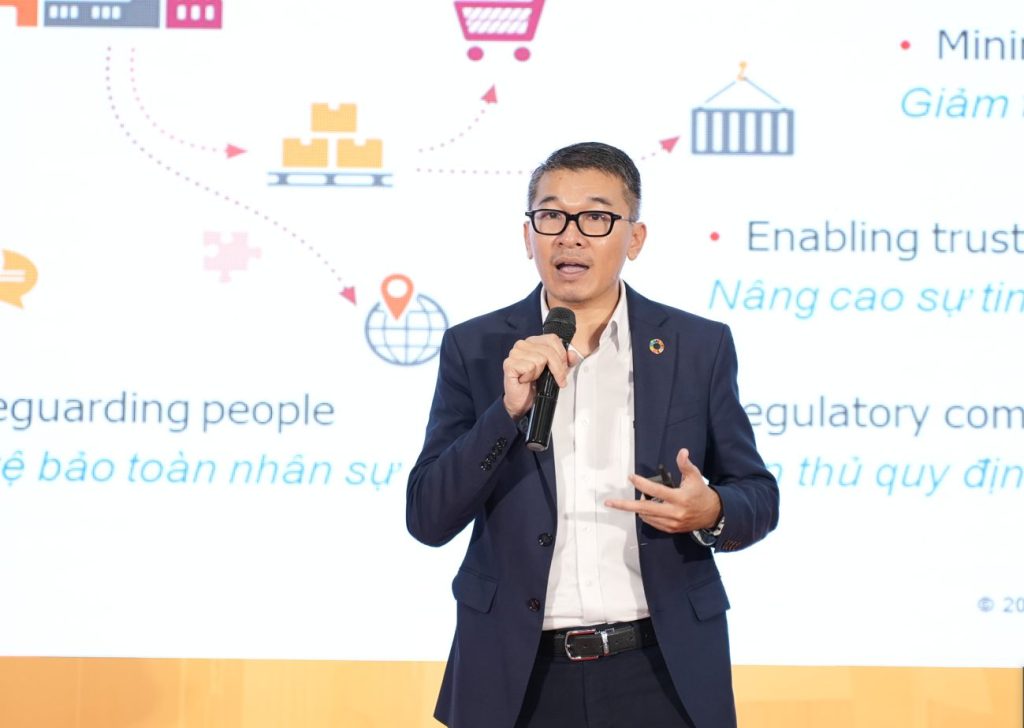
The next content introduced by Mr. Khang is about ESG Standards and strategies to improve ESG ratings for logistics companies. The contents of the Background of Sustainable Development, Framework and Standards for Sustainable Development and Benefits and Preparation for Organizations are presented in turn with the aim of highlighting the important features that logistics businesses need to focus on to achieve ESG standards quickly and effectively. According to information from the survey results obtained by Mr. Khang, the ESG trend will become an urgent requirement for the accelerating change when up to 45% of CEOs are not confident that their company will survive more than a decade on the current path, up from 39% in 2023 and 88% of investors believe that companies that prioritize ESG initiatives represent a better opportunity for long-term profits than companies that do not.
Mr. Truong Vinh Khang shared about “ESG standards and measures to increase ESG ratings for logistics companies”. At the beginning of the sharing session, Mr. Truong Vinh Khang introduced an overview of the standards related to business operations provided by the British Standard Institution (BSI) and its partners. According to Mr. Khang, if these standards are strictly implemented, businesses will basically achieve ESG-related standards.
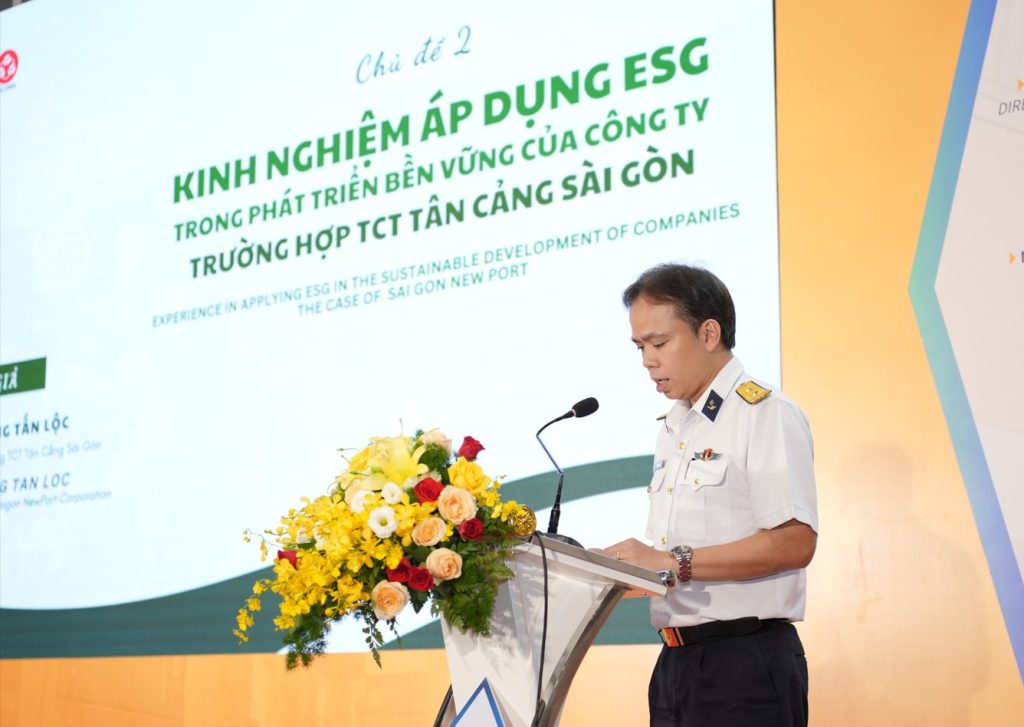
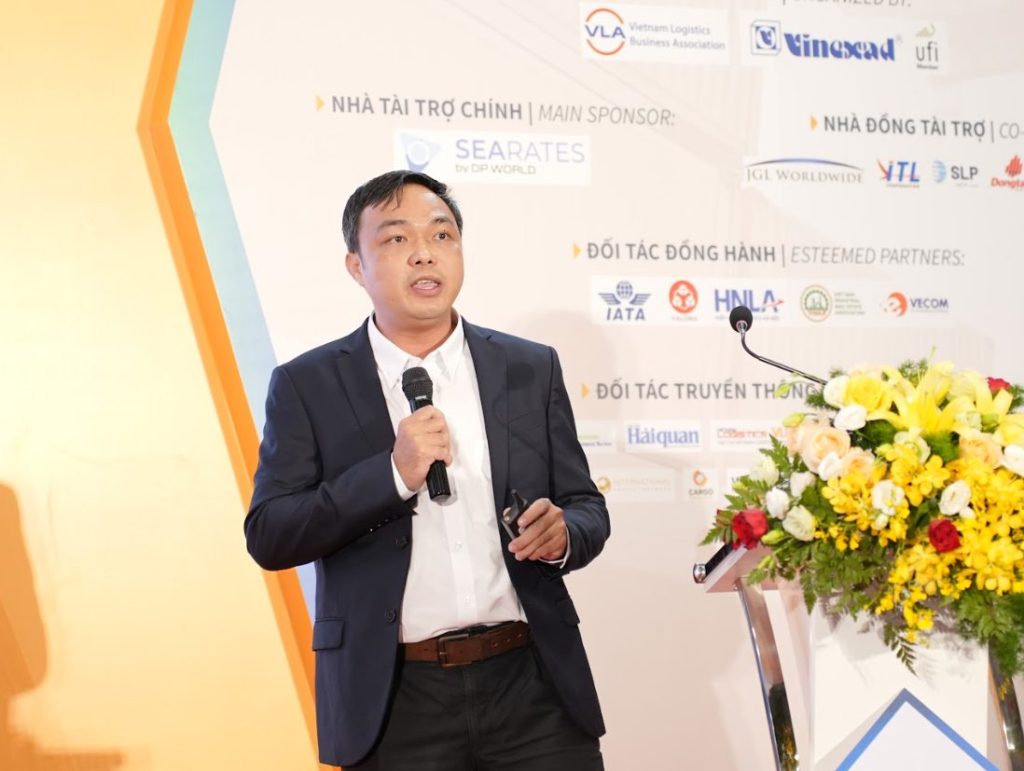
Mr. Loi introduced the trends and their impact on future job creation in the global and Vietnamese transportation and supply chain industry. In addition, Mr. Loi also emphasized the need for green skills and the role of ESG in the logistics and supply chain management industry. He presented that businesses are facing a green transformation in their operations and management. He mentioned the basic skills for green jobs for employees in the logistics and supply chain management sector including Environmental Awareness, Waste Reduction and Management, Energy and Water Efficiency.
Mr. Loi also mentioned the survey results conducted by the Vietnam Logistics Research and Development Institute (VLI) in July 2024 on green skills training – linking with ESG for human resources in the field of logistics and supply chain management. The results show that in terms of applying ESG standards to business operations, more than 60.8% of businesses are in the process of implementing. Accordingly, for businesses that have not yet implemented, nearly 90% of businesses will implement within the next 3-10 years. Regarding the implementation of green skills training for Logistics & SCM human resources in businesses, up to 63% of businesses are implementing and planning to implement. Thereby, it can be shown that currently, businesses are very interested in the issue of green transformation and green skills training for human resources.
VLI representative said that when surveying businesses on how to develop green skills for employees, 78% of businesses said that employees need to be continuously trained to improve “green skills” in the modern trend with applications of new technology; Businesses need to incorporate ESG vision into their development strategy with 72% choosing, businesses said that they need to recruit and have a remuneration policy (promotion, high salary, bonus) for human resources with green skills (58%) and the State needs to issue regulations and guidelines to increase transparency and promote ESG practices in Vietnam (52%).
In addition, Mr. Loi also proposed a series of solutions to train green skills for logistics human resources and supply chain management. For example, it is necessary to clearly identify the need for green skills that need to be equipped for workers to match the strategy, model, and business orientation; Strengthen training on “Green” working culture and mindset; Closely connect businesses and schools-associations/businesses-international organizations (such as VLA/VLI-VALOMA-AUS4SKILLS-UNESCAP) to develop training programs that integrate green skills; Orient training on new working methods (such as green jobs) and Focus on applying integration with international standard programs (such as FIATA, for both teachers and students).
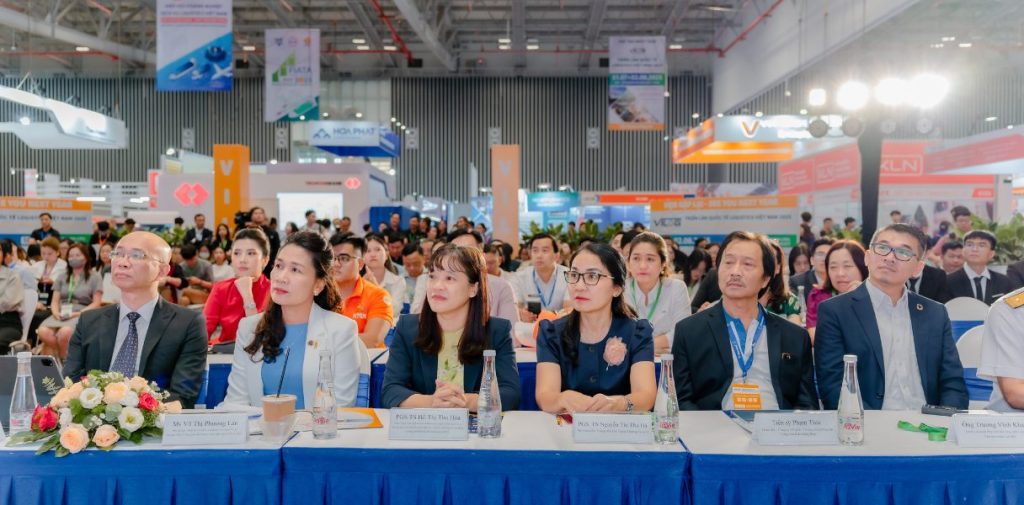

The forum is not only an academic event but also a golden opportunity to build and expand the network of relationships in the industry. The exchange and networking time within the framework of the forum has created conditions for participants to connect with many potential partners and colleagues. This is an important opportunity for experts, researchers and stakeholders in the logistics industry to exchange ideas, share experiences and establish strategic partnerships. Conversations during networking sessions not only open up new cooperation opportunities but also help strengthen and expand existing networks, thereby facilitating career development opportunities and business cooperation in the future.
The success of the Forum was also greatly contributed to by the thoughtful organization and careful preparation of the organizing committee. Every detail of the event was carefully taken care of, from inviting top speakers, designing the program to creating a favorable space for exchange and discussion. The organizing committee made constant efforts to ensure that all activities ran smoothly and effectively, from coordinating discussion sessions to organizing networking sessions. This careful preparation not only enhanced the quality of the event but also contributed greatly to creating an exciting and professional learning and networking environment, contributing to the overall success of the Forum.
Ending with many positive emotions and valuable lessons, the Vietnam Logistics Human Resources Training Forum – VLET 2024 left a deep impression on the members. The event promises to return next year with new improvements and experiences, continuing to affirm the important role in developing human resources and applying ESG in the logistics industry.
To see pictures of the Workshop, please see HERE
To view the presentations of the speakers at the Conference, please see HERE
Tag
